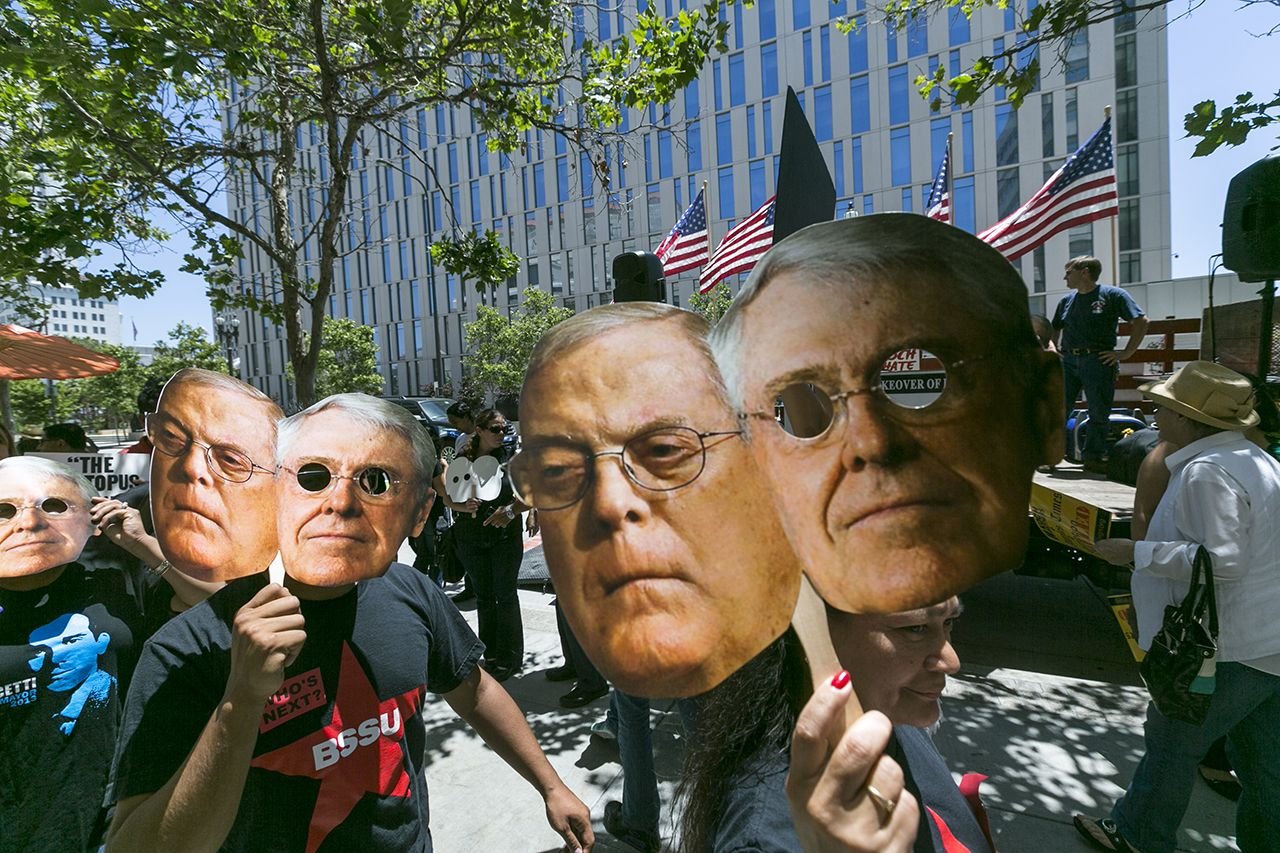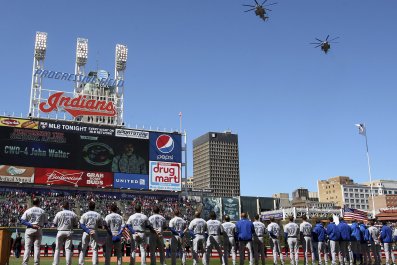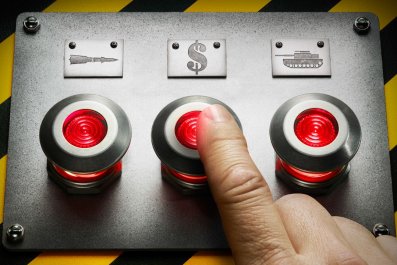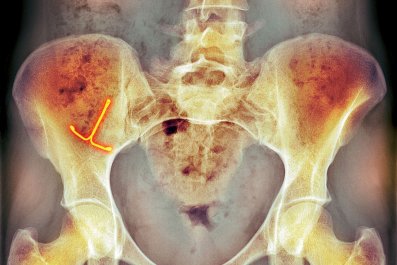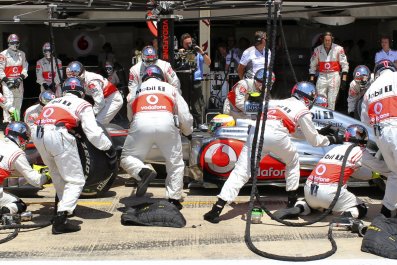It was early, even by New Hampshire standards. Sure, the state that holds America's first presidential primary is used to contenders stumping for votes two years before the election. But it's rare to see a grand forum—a cattle call!—with multiple would-be candidates showing up this soon to preen before the state's famously picky voters. (There's the old saw about an undecided New Hampshirite unable to back a presidential candidate: "I've only met him twice.") Yet on a lovely April Saturday, with the snow melted and anyone with any sense outside, some 700 New Hampshire conservatives were packed into a cheerless Best Western hotel.
There were senators Rand Paul and Ted Cruz, the Kentuckian and Texan, who have animated the Republican Party's right along with former Arkansas Governor Mike Huckabee, who is considering another run, and Tennessee's Rep. Marsha Blackburn, who may join the fray. Donald Trump was there, too, offering his trademark modesty and a tough-on-China stance that the crowd loved. Indeed, there were as many grievances as attendees: anti-gun control, anti the Internal Revenue Service and the National Security Agency, and loathing the common-core curriculum movement being pushed in public schools by the likes of Jeb Bush. But above all, they were all livid about that man in the White House and the health care program that bears his name.
What brought them to the state, whose motto is famously "Live free or die," was a forum co-hosted by the unobjectionable-sounding Americans for Prosperity Foundation (AFP). It is one of many groups backed by the Koch brothers, who stir plenty of objection.
The billionaire oil men are, of course, the Democratic Party's boogeymen. In an earlier age, the incantation of Karl Rove or Richard Nixon might have had a similar effect on Democratic blood pressure, Voldemort to their Harry Potter. Conversely, any presidential Republican candidates worth their copy of Ayn Rand's Atlas Shrugged or Friedrich Hayek's The Road to Serfdom would want to be at an event that bears the libertarian blessing of Charles and David Koch.
Democrats have made denouncing the Koch brothers and their money a fetish. Back in 2010, for instance, Barack Obama called them out by name when he chided campaign finance laws: "They don't have to say who, exactly, Americans for Prosperity are." It's true that entities started and mostly funded by the Koch brothers are using just a small part of the pair's astounding $80 billion fortune to finance a fusillade of TV and Internet ads aimed at "big government." Their network of think tanks, foundations and the like is all the more formidable since the Citizens United Supreme Court decision allowing more money into elections. (Is it a shock that the eponymous conservative group, Citizens United, co-hosted New Hampshire's Freedom Summit?)
But in recent weeks, with the midterm elections little more than six months away, Democrats have gone from grumbling about the Kochs to gunning for them. Their worry is that Koch-funded entities, like the AFP, have begun to spend eye-popping sums. In North Carolina, for instance, where freshman senator Kay Hagan is fighting to retain her seat, the AFP has already spent over $6 million in ads against her.
With the Democrats possibly losing control of the Senate, Harry Reid, their leader in that chamber, has gone after the Kochs with what seems like unprecedented language against private citizens. The Nevadan has called the Kochs "un-American" for "trying to buy America" and mentioned them over 100 times on the Senate floor. Reid has said that his wife came up with a tagline: that the Senate Republicans are "addicted to Koch." (That's some pillow talk.) Using the Senate floor to denounce the Kochs "is a desperation move of somebody who's about to potentially lose their job," says Steve Lombardo, the new chief communications and marketing officer at Koch Industries, recently recruited from PR giant Burson-Marsteller.
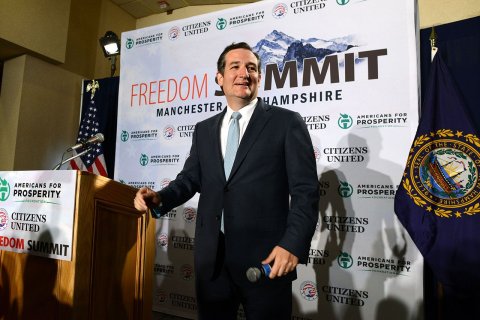
Republicans have pooh-poohed Reid's criticism, pointing to similarly large contributors on the Democratic side, which is only partly true. No pair of individuals comes close to the influence and ad buys of Koch-backed groups like the AFP. Republicans have also noted that the Kochs are philanthropists, whether it's giving $100 million to Manhattan's Lincoln Center or endowing wings at MIT or the arena where the National Collegiate Athletic Association's Wichita State basketball team plays, a few miles from Koch Industries' headquarters. Decked in jeans, a button-down and a tie, Rand Paul defended the Kochs shortly after delivering his stem-winder in New Hampshire. "There's a lot of politics in that, but the fact is that everybody gives," Paul told Newsweek, leaning casually against a colonnade pillar.
What should an average American think of the Koch brothers? Odious plutocrats or patriotic do-gooders? And how heavily do they really affect campaigns? It's worth keeping in mind that professionals in both parties have a vested interest in building up the already substantial impact of the Kochs. Republicans see them as loyal Americans coming to the rescue, while Democrats get a higher return on their solicitations simply by invoking the Koch name. Neither side has an incentive to say, "Yes, Koch money is a big deal, but it's not determinative." And neither side has an incentive to say the obvious: "Even if you believe that it's crazy to allow that much private money in politics, the Kochs are playing by the rules." It's like cockfighting: Don't hate the player, hate the game. The Koch geyser of money may be unusual but "un-American"? Oh, please.

If you look closely at the record, it's important to keep in mind that most of the foundations the Kochs generously support are not technically in the business of endorsing but, instead, educating. And while it may be fueled by money they've made in business, Koch Industries is run separately. This may appear to be a distinction without a difference, but it's the case for the AFP. "A lot of times people say this is some kind of electoral effort. It's about educating citizens over the long term," says Tim Phillips, the AFP's president and one of Washington's sharpest political minds, who has led a group that keeps up the fight even in nonelection years.
Still, what does Koch money buy? All totaled, the 17 groups heavily backed by the brothers raised over $400 million during the 2012 election cycle, according to research by The Washington Post and the Center for Responsive Politics.
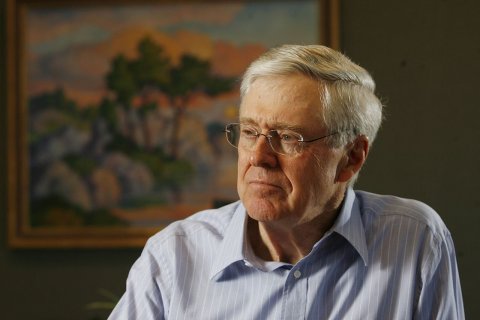
What did they get for it? President Romney? No. Democrats picked up seats in Senate and House elections. One could argue it might have been worse without their efforts, but that's still not Herculean.
Assessing the Kochs' impact raises a larger and timeless question in politics. What difference does money make? At the extremes, money is paramount. If Michael Bloomberg had been a bus driver instead of a billionaire, well, he'd be in traffic in Queens instead of New York's jet-setting former mayor. But rarely is money so clear-cut. Yes, all campaigns want more of it, but political scientist Samuel Popkin, who has studied how voters process information, asks, "Is the 100th ad more valuable than the 10th?" Money matters, but how much? And what if it's in the context of a mind-numbing number of other ads. It's not totally different from the age-old question: Does money buy happiness? It can help, especially when wealth lifts a person out of poverty, but after you have two cars, diminishing returns set in.
Given the Kochs' reach, there's no reason to doubt New York Rep. Steve Israel when he says their money can keep him tossing and turning at night. The Long Island congressman is the point man for House Democrats this election season, and he's made no secret about his concern that Koch-backed entities can inject huge sums into House races that are smaller (of course) and (usually) cheaper than Senate races, so that any infusion can make a difference.
But the boundlessly energetic Israel also said that invoking the Koch name spurs Democratic donors to open their wallets. "They're becoming a brand," he told Newsweek, one that has "two billionaires sweeping into a district." That fires up loyal Democrats. Other Democrats agree. "Look, we can't match them dollar for dollar, but we have to do a better job getting out our message, and this is also motivating our people," says one Democrat working on an embattled Senate campaign.
The Koch brothers' history and ideology raise intriguing questions about their efficacy. That they are rich is well known by now. Fully half of Americans have heard of Charles and David Koch, according to a recent survey. (There are two other brothers, Frederick and William, but they're not running the company or immersed in politics.) Charles takes the lead in running Koch Industries, one of the largest privately held concerns in the country; it is short on glamorous Internet properties and long on immensely profitable staples of American commerce, including Stainmaster and Georgia-Pacific pulp-and-paper. The appropriately named Brawny paper towels are also owned by them.
Koch conservatism runs in the family. Their father, Fred, made his bones in oil refining, but after being sued he found himself losing work in Texas and found it in Joseph Stalin's Soviet Union in the 1930s, where he helped the Communist empire's gasoline industry. The political turmoil there led to colleagues of Koch being "disappeared," so the story goes, and Fred's politics turned sharply right, making him a supporter of the John Birch Society, which attacked the Eisenhower administration for being too soft on Communism. David and Charles eschew that style of politics, although Charles, in a recent Wall Street Journal op-ed defending the family's honor, jabbed his opponents as "collectivists"—a less than common pejorative that suggests how deeply his anti-Communism and free-market beliefs run. Indeed, for an hour each Sunday Charles tutored his two children in economics. The brothers will surely have a legacy that lives on through their business and charities, political and otherwise. In the coming years, the interesting question will be whether David, just 74, who has three children, and Charles, 78, who has two, including his son Chase, an executive at Koch Industries, will carry the mantle with one political focus like the Kennedys or branch out like the Rockefellers, who spawned Republican and Democratic officeholders.
For now, the brothers are more libertarian than Republican, more Austrian economics than Christian Coalition. David was not a supporter of Ronald Reagan in 1980; instead, he served as the vice presidential candidate and major funder for the Libertarian Party, which called for the abolition of major entitlement programs, the Federal Aviation Administration and Federal Drug Administration, and garnered nearly 1 million votes. That laissez-faire streak continues today. David Koch told reporters in 2012 he disagreed with Mitt Romney's opposition to legalizing gay marriage.
The Kochs are in the less-government business, not any social issue crusade. Indeed, the bulk of the AFP's ad buys have been about Obamacare as opposed to, say, the other conservative haunt, Benghazi. For now, Obamacare is the GOP mantra, but it's a one-note samba, and since a group like the AFP can't be an extension of individual campaigns, that leaves it a tad limited and finding itself running essentially identical ads in different states. True, the divide between campaigns and what are dubbed 501(c)4 foundations can seem permeable—and at some point the Supreme Court will likely tear down any remaining barriers between parties and committees and the like. But until then, the Koch money is at least a tad restricted.
This inability to coordinate money can diminish its efficacy, making for a pileup. During the 2012 Republican primaries, for instance, the independent money of casino magnate Sheldon Adelson was aimed at Romney, portraying him as a Massachusetts liberal with shady business practices, and it helped undermine Romney in the general election.
In other words, money from outside groups and individuals can have unintended consequences. The AFP's principled libertarianism puts pressure on Republicans—for instance, when it comes to not taking Medicare funds as part of the Affordable Care Act, a position some Republicans believe may weaken them politically. In Tennessee, the AFP is leaning on the GOP governor to abolish the income tax, while the Georgia chapter has actually been at odds with the Tea Party Patriots over solar energy mandates from the state's Public Service Commission. The national coordinator of the Tea Party Patriots juxtaposed the AFP with a "Green Tea coalition" in favor of solar.
The real X factor in politics is not money, Koch or otherwise, but the alchemy of money and enthusiasm. That's what Obama had in 2008, and it's what the right was able to engender in Wisconsin after the 2010 election, when Republican Governor Scott Walker, with a lot of help from conservative groups like the AFP, took on public employee unions. (It riled up the left, too.) The AFP is trying to raise its already impressive ground game to generate enthusiasm. "We have metrics. We are doing the hard work. Door to door. Calls. Yard signs," said Corey Lewandowski, a former police officer and the AFP's national director of voter registration at the New Hampshire event, who was flanked by two of his ground troops.
Building enthusiasm for cutting government after the Bush-Obama/Great Recession era isn't easy. To some degree, the Koch-funded network has made progress. It's impossible to imagine today's Republicans pushing for Medicare expansion the way George W. Bush did when he successfully championed a prescription drug benefit in 2003. A few years ago, cap-and-trade curbs on greenhouse gas emissions was embraced by the GOP presidential nominee, John McCain. There's no way that'll happen in 2016, in part thanks to the AFP. But riling up anti-government sentiment has been a struggle for conservatives since the New Deal, which is why government grew even under Reagan and pipe dreams like abolishing the Department of Education have remained just that.
Democratic efforts to vilify the Kochs are a rational response to big money, but it's unlikely to spur voters to the polls. "It's a bank shot," says a political analyst, who strives to be nonpartisan and therefore declined to be named. "You have to educate voters on who the Koch bothers are, then say why they're bad and then link it to the candidate. Portraying Romney as a predatory fat cat was more direct."
What's more, explaining why, say, David, who donated millions to cancer research and the dinosaur wing at the American Museum of Natural history, is a monster is a tough sell, although Democrats are trying. In West Virginia, endangered Democratic congressman Nick Rahall is being boosted by ads that chide the high-living Park Avenue billionaires trying to defeat him. David does live at Manhattan's 740 Park, which has been called the world's wealthiest address, but Charles is firmly ensconced in Wichita, Kan., where Koch Industries is headquartered.
AFP ads often have a lighter touch than portraying the Kochs as predatory capitalists, one that speaks to the ways in which the Kochs remain so formidable. In one a woman speaks directly to camera. "People don't like political ads," she says. "I don't like them either. But health care isn't about politics." She then laments Obamacare, more in sadness than anger. "It just doesn't work," she says, sighing. Despite some initial successes and failures, the jury is out on that, just as it is on the Koch brothers' efforts in this election.



